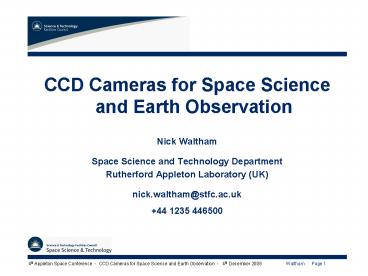CCD Cameras for Space Science and Earth Observation - PowerPoint PPT Presentation
1 / 30
Title: CCD Cameras for Space Science and Earth Observation
1
- CCD Cameras for Space Science and Earth
Observation - Nick Waltham
- Space Science and Technology Department
- Rutherford Appleton Laboratory (UK)
- nick.waltham_at_stfc.ac.uk
- 44 1235 446500
2
Contents
- Historical background.
- CCD principles.
- The scientific CCD.
- CCDs in Space Science and Earth Observation.
- Recent highlights from RAL.
3
The charge-coupled device (CCD)
- Invented in 1969 by Boyle and Smith at Bell
Laboratories. - 40th anniversary of the CCD (next year).
- 1969 also famous for Apollo 11 . . .
Slow-scan TV camera 35 mm
film
4
CCDs in everyday life
Security
Industrial machine vision
5
CCD Principles
6
CCD Principles
Charge transfer through the substrate
7
CCDs in Space
1969
1986
1979
1999
Today
1986
1979
CCDs first flown in space
CCDs first invented
8
CCDs in Space
1969
1979
1999
Today
1986
Russian Vega 1/2 ESAs Giotto missions
to Comet Halley
9
CCDs in Space
1969
1979
1999
Today
1989
Galileo
10
CCDs in Space
1969
1979
1999
Today
1990
Hubble
11
CCDs in Space
1969
1979
1999
Today
1989
Planetary Science
Solar Physics
Astronomy
12
CCDs in Space
1969
1979
1999
Today
1989
Urban mapping
Climate change
Disaster Monitoring
13
The scientific CCD
- Large format Tens of millions of pixels and
wafer-scale. - Near perfect quantum efficiency (peak 95 ).
- Almost zero readout noise few electrons rms.
- Dynamic range 100,000 ( 16 bits).
e2v technologies 61 x 61 mm
Sony 1/4 inch
14
CCD varieties - Imaging arrays
Hubble WFC3 4k x 2k pixels
STEREO 2k x 2k pixels
GAIA 4.5k x 2k pixels
SDO 4k x 4k pixels
15
CCD varieties - Linear arrays
Spot 5 12,000 pixel linear CCD
Push-broom imaging
16
Recent highlights from RAL
- Solar physics
- STEREO / SECCHI.
- Solar Dynamics Observatory.
- Earth observation
- Medium / high resolution cameras.
17
STEREO
Observing Coronal Mass Ejections from the Sun to
the Earth using the STEREO SECCHI Instruments
STEREO Solar TErrestrial RElations Observatory
SECCHI Sun Earth Connection Coronal and
Heliospheric Investigation
18
The SECCHI payload on STEREO
UV Imager EUVI Coronagraphs COR1 COR2 COR1
- 1.1-3.0 solar radii COR2 - 2-15 solar radii
- Heliospheric Imager (HI)
- HI-1 - 20 degrees
- HI-2 - 70 degrees
19
Images from the five cameras in SECCHI
The Sun
COR1 EUVI
HI-1 COR2
HI-2
20
(No Transcript)
21
(No Transcript)
22
Solar Dynamics Observatory
- CCD camera design for AIA and HMI instruments.
- New 4kx4k pixel CCD (12 ?m pixel size).
- 2 Mpixels/s readout from 4 corners.
- Requirements for high dynamic range, low noise.
- Reduced size, mass, and power.
23
Solar Dynamics Observatory
First mission within NASAs LWS - Launch 2009
In-house, custom-designed video processing and
digitization ASIC
24
TopSat - high resolution Earth imaging
- TopSat 2.5 m GSD Camera
- Panchromatic 2.5 m GSD _at_ 600 km
- R/G/B Colour 5.0 m GSD
- 17 km swath.
- 1.68 m focal length.
- 0.2 m aperture.
- Size 760 x 640 x 450 mm
- Mass 30 kg mass.
- Power 20 W
25
TOPSAT - high resolution Earth imaging
26
TOPSAT - high resolution Earth imaging
27
Technology spin-out
MacDonald Dettwiler and Associates
28
RALCam-4 1 m GSD Camera
- 1 m GSD panchromatic
- 20 km swath
- 4 m GSD R/G/B/NIR
- 6 m focal length
- 480 mm aperture
- Length 1.17 m
- Mass 76 kg
- Power 60 W
29
Medium resolution Earth imaging
- RALCam-3 - 10 m GSD
- 4 linear CCDs.
- 8800 pixels per array.
- 88 km swath.
- R, G, B, NIR wavebands.
- 46 cm focal length.
- Size 750 x 145 x 145 mm
- Mass 10 kg mass.
- Power 20 W
3 element lens based camera optics
30
Brazilian Amazonia-1
Thank you for your attention































